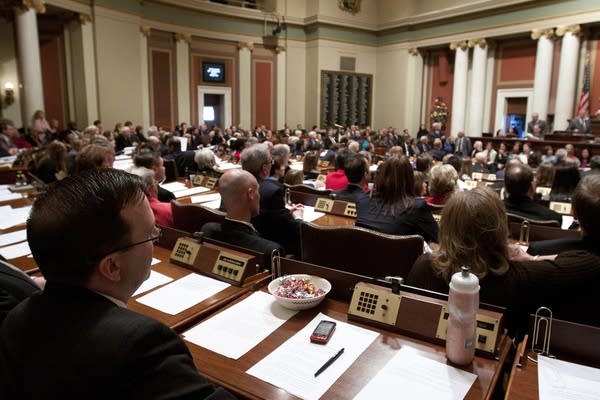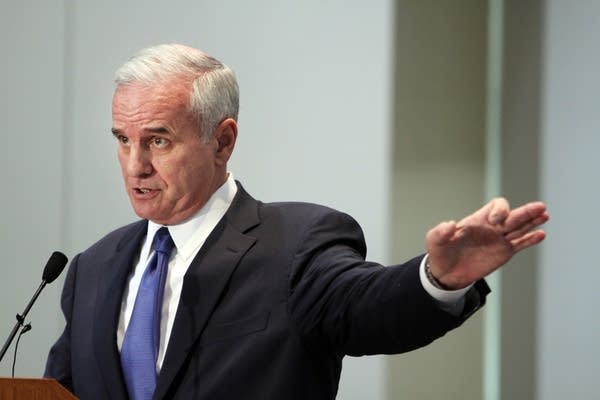Minn. House passes GOP-favored income tax cut
Go Deeper.
Create an account or log in to save stories.
Like this?
Thanks for liking this story! We have added it to a list of your favorite stories.

The Minnesota House of Representatives voted Monday to cut state income and property taxes on businesses while slashing aid to several large cities, fulfilling key Republican priorities and setting the table for a conflict with Democratic Gov. Mark Dayton.
The House approved a package of tax changes on a 73-59 vote that fell mostly along party lines. Republicans who sponsored House File 42, which would cut state spending by $550 million over two years, said it's needed to help close the projected $5 billion state deficit while freeing more money in the private sector to encourage job growth.
"Leaving money in Minnesotans' pockets is what this needs to be all about," said Rep. Greg Davids, chairman of the House Tax Committee, who sponsored the bill.
"It's the private sector that creates wealth, not the government. The government can create jobs, but they're not creating wealth," said Davids, R-Preston. "We need more money in the private sector where it can create wealth. Folks, we're limiting state government to a 10 percent increase. So it's not like the sky is going to fall here."
Turn Up Your Support
MPR News helps you turn down the noise and build shared understanding. Turn up your support for this public resource and keep trusted journalism accessible to all.
Under the bill, income tax rates in the lowest two tax brackets would be reduced, providing $221 million in tax relief over two years. Because those in the top tax bracket pay a portion of their taxes based on the lower two rates, they would benefit from the cuts, too.

Davids said low- and middle-income taxpayers would get the most relief proportionately in terms of their incomes.
A Department of Revenue analysis showed a $12 yearly tax cut for a family earning less than $30,000 a year compared with $206 for those making more than $250,000 a year.
But the bill was bitterly opposed by the DFL minority.
Their biggest objection was to a measure to phase out Local Government Aid, or LGA, to the state's largest cities -- Minneapolis, St. Paul and Duluth -- which also happen to be DFL strongholds.
Under the plan, state aid payments to the three cities would be reduced by $250 million in the next two years, and eliminated entirely by 2014.
Republicans say they singled out those cities because they get the largest amounts of state aid under a formula accounting for tax capacity and needs.
They also said those cities were frittering away too much money. Republican Steve Drazkowski read off a list of projects undertaken in the city of Minneapolis.
"We're limiting state government to a 10 percent increase. So it's not like the sky is going to fall here."
"Five million dollars on a green roof for the Target Center; $460,000 for a green roof for city hall; $1.75 million for public art; up to $1,500 for a theater energy survey, outdoor clotheslines, garden space," he said.
But Rep. Kerry Gauthier, DFL-Duluth, said his city has taken drastic steps in recent years to keep up with declines in state government aid.
"You will be responsible for the 20 percent police reduction. You will be responsible for the 20 percent fire reduction," Gauthier said. "Those potholes we all hate - when you break your axle, it's because we won't be able to afford anymore to fix it."
Only DFLer Ann Lenczewski joined the GOP majority to vote for the bill.
The passage of the House tax bill was the first major volley in a week of planned votes on pieces of the GOP budget solution.
But even as the floor debates were getting under way, Dayton warned that he would not sign individual budget bills until he and Republican legislative leaders reach an overall deal on state tax and spending levels for the two-year period that starts July 1.
"I will not favorably consider a single budget bill without knowing its relationship to a complete and balanced budget solution," Dayton wrote to top lawmakers.
Dayton also told Republicans that they risked a veto if they put policy provisions in their finance bills. And he said he expected lawmakers to abide by estimates from state finance experts who calculated the costs of proposed legislation.
DFL House Minority Leader Paul Thissen repeated the concerns of some Democrats who claim the Republicans' budget bills are not based on reliable financial estimates.
"I can't imagine that you approve of the Enron accounting going on in these bills," said Thissen. "Maybe a billion dollars of Monopoly money is being used this week to fill the $5 billion budget hole. But that's really what's going on in the Republican House budget."
The House GOP bill also reduces property tax refunds for renters. About half of the 38,000 recipients of the credit earn less than $20,000 a year, Democrats said. But Republicans accused Democrats of lacking the willpower to support any move to control state spending.
"What we're embarking on here today is a whole week long of hearing from the Democrats how they absolutely cannot do anything but fully fund every program, starting with local government aid," said Rep. Linda Runbeck, R-Circle Pines. "We'll hear hysterics, we'll hear how awful it is to do anything but fully fund all these programs."
A Senate tax bill, due for a vote later this week, does not include the income tax cuts and spreads local government aid cuts more widely among the state's cities. The Senate bill, which would cut spending by $580 million, extends more property tax relief to businesses by phasing out the state property tax on businesses entirely over the next dozen years.
Earlier Monday, the Senate passed an agriculture finance bill with a few Democrats joining all Republicans in support. There was no such bipartisanship for or a jobs and economic development spending plan that cleared the chamber on a party-line vote.
The House was also debating a transportation funding measure later Monday night.
Transportation Commissioner Tom Sorel said the level of cuts could put federal transportation dollars at risk, while Metropolitan Council Chairwoman Susan Haigh predicted steep fare increases and deep service cuts to Twin Cities transit service.
(Associated Press writers Patrick Condon and Martiga Lohn contributed to this report)




